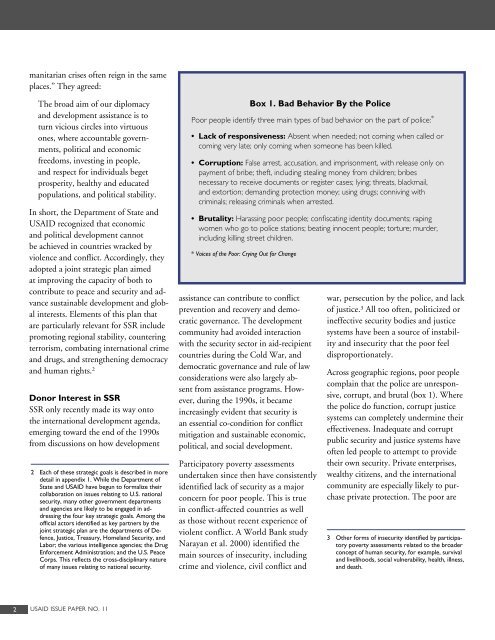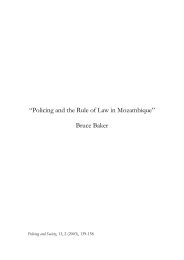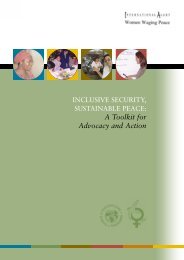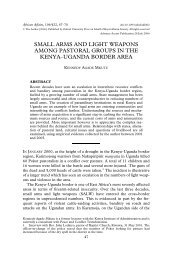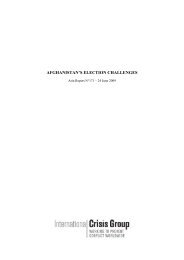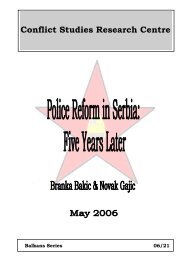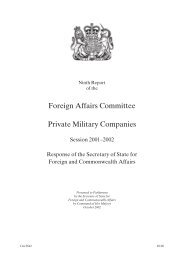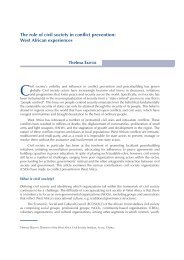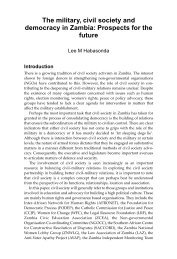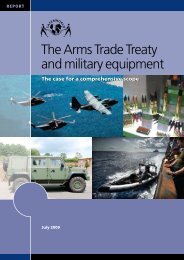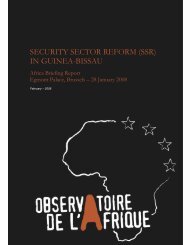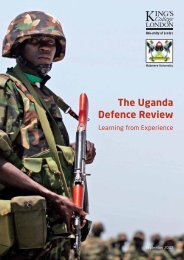promoting security sector reform in fragile states - GFN-SSR
promoting security sector reform in fragile states - GFN-SSR
promoting security sector reform in fragile states - GFN-SSR
You also want an ePaper? Increase the reach of your titles
YUMPU automatically turns print PDFs into web optimized ePapers that Google loves.
manitarian crises often reign <strong>in</strong> the same<br />
places.” They agreed:<br />
The broad aim of our diplomacy<br />
and development assistance is to<br />
turn vicious circles <strong>in</strong>to virtuous<br />
ones, where accountable governments,<br />
political and economic<br />
freedoms, <strong>in</strong>vest<strong>in</strong>g <strong>in</strong> people,<br />
and respect for <strong>in</strong>dividuals beget<br />
prosperity, healthy and educated<br />
populations, and political stability.<br />
In short, the Department of State and<br />
USAID recognized that economic<br />
and political development cannot<br />
be achieved <strong>in</strong> countries wracked by<br />
violence and conflict. Accord<strong>in</strong>gly, they<br />
adopted a jo<strong>in</strong>t strategic plan aimed<br />
at improv<strong>in</strong>g the capacity of both to<br />
contribute to peace and <strong>security</strong> and advance<br />
susta<strong>in</strong>able development and global<br />
<strong>in</strong>terests. Elements of this plan that<br />
are particularly relevant for <strong>SSR</strong> <strong>in</strong>clude<br />
<strong>promot<strong>in</strong>g</strong> regional stability, counter<strong>in</strong>g<br />
terrorism, combat<strong>in</strong>g <strong>in</strong>ternational crime<br />
and drugs, and strengthen<strong>in</strong>g democracy<br />
and human rights. 2<br />
Donor Interest <strong>in</strong> <strong>SSR</strong><br />
<strong>SSR</strong> only recently made its way onto<br />
the <strong>in</strong>ternational development agenda,<br />
emerg<strong>in</strong>g toward the end of the 1990s<br />
from discussions on how development<br />
2 Each of these strategic goals is described <strong>in</strong> more<br />
detail <strong>in</strong> appendix 1. While the Department of<br />
State and USAID have begun to formalize their<br />
collaboration on issues relat<strong>in</strong>g to U.S. national<br />
<strong>security</strong>, many other government departments<br />
and agencies are likely to be engaged <strong>in</strong> address<strong>in</strong>g<br />
the four key strategic goals. Among the<br />
official actors identified as key partners by the<br />
jo<strong>in</strong>t strategic plan are the departments of Defence,<br />
Justice, Treasury, Homeland Security, and<br />
Labor; the various <strong>in</strong>telligence agencies; the Drug<br />
Enforcement Adm<strong>in</strong>istration; and the U.S. Peace<br />
Corps. This reflects the cross-discipl<strong>in</strong>ary nature<br />
of many issues relat<strong>in</strong>g to national <strong>security</strong>.<br />
assistance can contribute to conflict<br />
prevention and recovery and democratic<br />
governance. The development<br />
community had avoided <strong>in</strong>teraction<br />
with the <strong>security</strong> <strong>sector</strong> <strong>in</strong> aid-recipient<br />
countries dur<strong>in</strong>g the Cold War, and<br />
democratic governance and rule of law<br />
considerations were also largely absent<br />
from assistance programs. However,<br />
dur<strong>in</strong>g the 1990s, it became<br />
<strong>in</strong>creas<strong>in</strong>gly evident that <strong>security</strong> is<br />
an essential co-condition for conflict<br />
mitigation and susta<strong>in</strong>able economic,<br />
political, and social development.<br />
Participatory poverty assessments<br />
undertaken s<strong>in</strong>ce then have consistently<br />
identified lack of <strong>security</strong> as a major<br />
concern for poor people. This is true<br />
<strong>in</strong> conflict-affected countries as well<br />
as those without recent experience of<br />
violent conflict. A World Bank study<br />
Narayan et al. 2000) identified the<br />
ma<strong>in</strong> sources of <strong>in</strong><strong>security</strong>, <strong>in</strong>clud<strong>in</strong>g<br />
crime and violence, civil conflict and<br />
Box 1. Bad Behavior By the Police<br />
Poor people identify three ma<strong>in</strong> types of bad behavior on the part of police: *<br />
• Lack of responsiveness: Absent when needed; not com<strong>in</strong>g when called or<br />
com<strong>in</strong>g very late; only com<strong>in</strong>g when someone has been killed.<br />
• Corruption: False arrest, accusation, and imprisonment, with release only on<br />
payment of bribe; theft, <strong>in</strong>clud<strong>in</strong>g steal<strong>in</strong>g money from children; bribes<br />
necessary to receive documents or register cases; ly<strong>in</strong>g; threats, blackmail,<br />
and extortion; demand<strong>in</strong>g protection money; us<strong>in</strong>g drugs; conniv<strong>in</strong>g with<br />
crim<strong>in</strong>als; releas<strong>in</strong>g crim<strong>in</strong>als when arrested.<br />
• Brutality: Harass<strong>in</strong>g poor people; confiscat<strong>in</strong>g identity documents; rap<strong>in</strong>g<br />
women who go to police stations; beat<strong>in</strong>g <strong>in</strong>nocent people; torture; murder,<br />
<strong>in</strong>clud<strong>in</strong>g kill<strong>in</strong>g street children.<br />
* Voices of the Poor: Cry<strong>in</strong>g Out for Change<br />
war, persecution by the police, and lack<br />
of justice. 3 All too often, politicized or<br />
<strong>in</strong>effective <strong>security</strong> bodies and justice<br />
systems have been a source of <strong>in</strong>stability<br />
and <strong>in</strong><strong>security</strong> that the poor feel<br />
disproportionately.<br />
Across geographic regions, poor people<br />
compla<strong>in</strong> that the police are unresponsive,<br />
corrupt, and brutal (box 1). Where<br />
the police do function, corrupt justice<br />
systems can completely underm<strong>in</strong>e their<br />
effectiveness. Inadequate and corrupt<br />
public <strong>security</strong> and justice systems have<br />
often led people to attempt to provide<br />
their own <strong>security</strong>. Private enterprises,<br />
wealthy citizens, and the <strong>in</strong>ternational<br />
community are especially likely to purchase<br />
private protection. The poor are<br />
3 Other forms of <strong>in</strong><strong>security</strong> identified by participatory<br />
poverty assessments related to the broader<br />
concept of human <strong>security</strong>, for example, survival<br />
and livelihoods, social vulnerability, health, illness,<br />
and death.<br />
2 USAID ISSUE PAPER NO. 11


